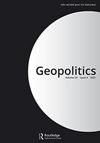More-Than-Human Borders: A New Research Agenda for Posthuman Conversations in Border Studies
IF 3
1区 社会学
Q1 GEOGRAPHY
引用次数: 0
Abstract
ABSTRACT Despite a growing interest in posthuman theory within political geography over the last two decades, the sub-disciplinary focus of critical border studies has seen a slower engagement with more-than-human entanglements. In this introductory paper to the special section, we ask whether the militarisation of borderlands, increasing surveillance of mobility, growing violence against refugees and asylum seekers, pandemic bordering, and mass displacement can be fully grasped through a singular focus upon the agency of the human subject. In addressing these questions, we challenge what we see as an anthropocentric preoccupation of existing scholarship in critical border studies and argue that the border is a constantly moving space that is created, maintained and/or dismantled by the entanglements of human and non-human lives and things. Our aim in bringing posthuman conversations into critical border studies is to explore different methods and questions that challenge binary constructions in our understandings of borders. In our response to these challenges, within this opening piece, we map three areas of debate: rethinking the heterogeneity of more-than-human borders; studying the agency of ‘things’ of the border; and finally, considering dehumanising practices of border politics. We suggest that the scholarship on more-than-human borders can be seen as a ‘minor literature’ that calls for a genuine realisation of forgotten and suppressed languages, voices, and knowledges.超越人类的边界:边界研究中后人类对话的新研究议程
摘要尽管在过去的二十年里,政治地理学界对后人类理论的兴趣越来越大,但批判性边界研究的亚学科焦点却发现,与人类以外的纠缠的接触速度较慢。在本特别部分的介绍性文件中,我们询问,是否可以通过单一关注人类主体的能动性来充分理解边境地区的军事化、对流动性的日益监控、针对难民和寻求庇护者的暴力行为日益增加、大流行病边界和大规模流离失所。在解决这些问题的过程中,我们对批判性边界研究中现有学术中以人类为中心的关注提出了质疑,并认为边界是一个不断移动的空间,是由人类和非人类的生活和事物的纠缠所创造、维持和/或拆除的。我们将人后对话纳入批判性边界研究的目的是探索不同的方法和问题,挑战我们对边界理解中的二元结构。在我们应对这些挑战的过程中,在这篇开篇文章中,我们描绘了三个辩论领域:重新思考人类边界之外的异质性;研究边界“事物”的代理;最后,考虑到边境政治的非人性化做法。我们认为,关于超越人类边界的学术可以被视为一种“次要文学”,它呼吁真正实现被遗忘和压抑的语言、声音和知识。
本文章由计算机程序翻译,如有差异,请以英文原文为准。
求助全文
约1分钟内获得全文
求助全文
来源期刊

Geopolitics
Multiple-
CiteScore
7.60
自引率
10.30%
发文量
50
期刊介绍:
The study of geopolitics has undergone a major renaissance during the past decade. Addressing a gap in the published periodical literature, this journal seeks to explore the theoretical implications of contemporary geopolitics and geopolitical change with particular reference to territorial problems and issues of state sovereignty . Multidisciplinary in its scope, Geopolitics includes all aspects of the social sciences with particular emphasis on political geography, international relations, the territorial aspects of political science and international law. The journal seeks to maintain a healthy balance between systemic and regional analysis.
 求助内容:
求助内容: 应助结果提醒方式:
应助结果提醒方式:


